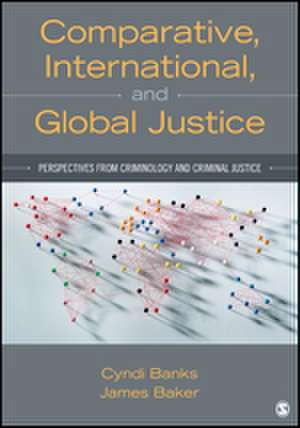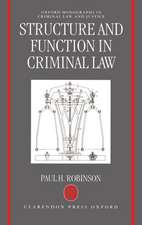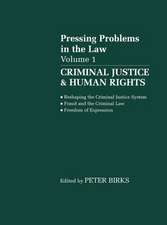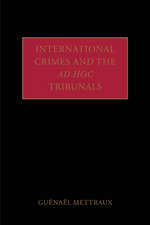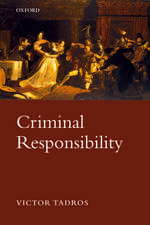Comparative, International, and Global Justice: Perspectives from Criminology and Criminal Justice
Autor Cyndi L. Banks, Denis William James Bakeren Limba Engleză Paperback – 14 dec 2015
The authors challenge students to gain knowledge of international and comparative criminal justice issues and think about them in a critical manner. It has become difficult to ignore the global and international dimensions of criminal justice and criminology and this text aims to enhance criminal justice education by focusing on some of the issues engaging criminology worldwide, and to prepare students for a future where fields of study like transnational crime are unexceptional.
This book is accompanied by a companion website: http://study.sagepub.com/banksbaker
Preț: 924.69 lei
Preț vechi: 1266.70 lei
-27% Nou
Puncte Express: 1387
Preț estimativ în valută:
176.96€ • 184.07$ • 146.09£
176.96€ • 184.07$ • 146.09£
Carte tipărită la comandă
Livrare economică 12-26 aprilie
Preluare comenzi: 021 569.72.76
Specificații
ISBN-13: 9781483332383
ISBN-10: 1483332381
Pagini: 592
Dimensiuni: 178 x 254 x 46 mm
Greutate: 0.86 kg
Ediția:1
Editura: SAGE Publications
Colecția Sage Publications, Inc
Locul publicării:Thousand Oaks, United States
ISBN-10: 1483332381
Pagini: 592
Dimensiuni: 178 x 254 x 46 mm
Greutate: 0.86 kg
Ediția:1
Editura: SAGE Publications
Colecția Sage Publications, Inc
Locul publicării:Thousand Oaks, United States
Recenzii
“There is no question that the book is very well researched and the authors have done an excellent job of bringing new insights and new perspectives to the topic.”
“Any analysis of global justice which moves from circumspection about traditions of comparative criminal justice and transnational criminology is to be much welcomed. Similarly to indicting the present era of globalisation as it destroys the prevailing global economic model, a cross-cultural analysis of crime and justice themes reveals that global justice as a hegemonic exercise. It need not be so. In fact the massive strains in global governance today highlight the urgent need to engage with a holistic understanding of global justice. Banks and Baker convincingly wrestle with the need to study global justice, providing a cogent overview of globalisation and its influences on criminal justice, criminology and emerging international criminalisation. The books scope and coverage is as vast as is its aspiration to provide synergies across contemporary and often competing conceptualisations of global justice, is commendable. For students approaching this confusing field of scholarship and policy development the book is an important new guide.”
“With this volume, Cyndi Banks and James Baker add a well-organized and intelligently written text to the field of criminology and criminal justice education... Students have much to gain from this volume. Even those interested primarily in crime and criminal justice in the United States (or in any other country) will understand that the knowledge they acquire is inadequate if it neglects the global contexts in which crime and criminal justice are embedded."
“Any analysis of global justice which moves from circumspection about traditions of comparative criminal justice and transnational criminology is to be much welcomed. Similarly to indicting the present era of globalisation as it destroys the prevailing global economic model, a cross-cultural analysis of crime and justice themes reveals that global justice as a hegemonic exercise. It need not be so. In fact the massive strains in global governance today highlight the urgent need to engage with a holistic understanding of global justice. Banks and Baker convincingly wrestle with the need to study global justice, providing a cogent overview of globalisation and its influences on criminal justice, criminology and emerging international criminalisation. The books scope and coverage is as vast as is its aspiration to provide synergies across contemporary and often competing conceptualisations of global justice, is commendable. For students approaching this confusing field of scholarship and policy development the book is an important new guide.”
“With this volume, Cyndi Banks and James Baker add a well-organized and intelligently written text to the field of criminology and criminal justice education... Students have much to gain from this volume. Even those interested primarily in crime and criminal justice in the United States (or in any other country) will understand that the knowledge they acquire is inadequate if it neglects the global contexts in which crime and criminal justice are embedded."
Cuprins
CHAPTER 1: INTRODUCTION
Terminology
Why Study Global Justice Issues?
Globalization
New International Crimes
Overview of the Text
CHAPTER 2: COMPARATIVE CRIMINAL JUSTICE: COMPARING CRIME ACROSS COUNTRIES
Comparing Criminal Justice: Methodological Issues
International Crime Data
Countries with Low Crime Rates: Japan and Saudi Arabia
What can be Learned from Comparing International Data?
How does the U.S Compare Internationally?
CHAPTER 3: SYSTEMS OF LAW: COMMON LAW, CIVIL LAW, SOCIALIST LAW, ISLAMIC LAW, INDIGENOUS LAW
Common Law Systems
Civil Law Systems
The Role of Revolution and Governance in Shaping Law
Socialist Legal Systems
Islamic Law Systems
Indigenous Legal Systems
CHAPTER 4: POLICING
Organizing Policing
Civilian and Military Policing Models
Colonial Policing
Democratic Policing
Case Studies of Policing: Russia and China
Policing in Russia
Policing in the People’s Republic of China
Transnational Policing and International Cooperation on Policing
Policing Through Global Surveillance and the Management of Risk
CHAPTER 5: COURTS AND CRIMINAL PROCEDURE
Adversarial, Inquisitorial and Hybrid Systems of Criminal Justice
Inquisitorial Procedure in France
Reforming the Inquisitorial Model: Latin America
Reforming the Inquisitorial Model: Russia and Eastern Europe
Criminal Law and Procedure in China
Prosecutors and the Prosecution Function
CHAPTER 6: PUNISHMENT
The Rationale for Punishment
Punitive Punishment
Capital Punishment
Comparing Punishments
Punishment in the West: Social, Historical and Cultural Background
Colonial Punishment Regimes
Criminal Punishment in Japan
Criminal Punishment in China
CHAPTER 7: JUVENILE JUSTICE
Childhood, Criminal Responsibility and Juvenile Justice Systems
Juvenile Justice Systems: Commonalities and Trends
Juvenile Justice Systems: France, Japan and China
France
Japan
People’s Republic of China
Globalizing Juvenile Justice
Systems
CHAPTER 8: TRANSITIONAL JUSTICE: JUSTICE, FORGIVENESS AND IMPUNITY
International Crimes: Governments, Citizens and Violence
The Origins and Growth of Transitional Justice
Theorizing Transitional Justice
Amnesty and Impunity, or Punishment?
Seeking and Telling the Truth: Truth Commissions
Reparations: Compensating for Abuses
Lustration and Transforming State Security
Case Studies in Transitional Justice: East Timor and Rwanda
East Timor
Rwanda
Observations and Critiques: Transitional Justice
CHAPTER 9: THE INTERNATIONAL CRIMINAL COURT
International Criminal Law
Creation of the International Criminal Court
Statute of the International Criminal Court
U.S. Opposition to the International Criminal Court
Countering the ICC: U.S. Responses
Changes in U.S Attitude to the ICC
The International Criminal Court in Action
Sudan and the ICC
Democratic Republic of Congo (DRC) and the ICC
The Prosecutor and the Office of the Prosecutor
The International Criminal Court and Transitional Justice
Victims and the International Criminal Court
How Effective is the International Criminal Court?
CHAPTER 10: TRANSNATIONAL CRIME
Definitions and Explanations of the Concept of Transnational Crime
The Growth of Transnational Crime
Drug Trafficking
Arms Trafficking
Smuggling of Nuclear Materials
Money Laundering
Trading in Endangered Species
Terrorism Financing
Transnational Cybercrime
Combating Transnational Crime
Critiques of the Concept of Transnational Crime
CHAPTER 11: HUMAN TRAFFICKING ACROSS BORDERS
The International Legal Framework Prohibiting Human Trafficking and Providing for Victims of Trafficking
“White Slavery”
Sex Trafficking
What Accounts for Human Trafficking?
Scale of Human Trafficking
Trafficking as a Transnational Criminal Enterprise
Recruitment and Transportation of Trafficking Victims
Obtaining Residence in the Receiving Country
Controlling Victims of Trafficking
Labor Trafficking
Sex Tourism
Organ Trafficking
Trafficking of Minors
Regional Trafficking: Asia
Regional Trafficking: Eurasia and Eastern Europe
Regional Trafficking: Europe
Regional Trafficking: United States
Regional Trafficking: Latin America and Africa
Countering Human Trafficking
CHAPTER 12: TERRORISM
Explanations and Definitions of Terrorism
Guerrilla Warfare and Terrorism
State Terrorism
The Evolution of Terrorism
Religion, Violence and Terrorism
International Law and Terrorism
Counterterrorist Responses: United States, Germany and India
United States
Germany
India
Terrorist Groups
Hamas
Boko Haram
CHAPTER 13: VIOLENCE AGAINST WOMEN
Violence Against Women and Domestic Violence: Definitions and Explanations
Violence Against Women: International Action
Women’s Rights as Human Rights
National Strategies to Combat Violence Against Women
Dissemination and Diffusion of Global Norms on Violence Against Women
Country Profiles: Domestic Violence
Russian Federation
Nicaragua
Ghana
Violence Against Women: Honor Crimes
Violence Against Women: Armed Conflict
CHAPTER 14: HUMAN RIGHTS AND CULTURAL RELATIVISM: FEMALE CIRCUMCISION AND CHILD SOLDIERS
Female Circumcision
The Cultural and Social Context of Female Circumcision
Cultural Relativism and Female Circumcision
Claims for Asylum Based on the Practice of Female Circumcision
Changing the Practice of Female Circumcision: What Works?
Child Soldiers
Modern Forms of Warfare and Child Soldiers
Questioning Childhood
Girl Soldiers
Coercion, Agency and Victims
Internationalizing the Child Soldier: Victim and Perpetrator?
Reintegrating and Restoring the Child Soldier
Terminology
Why Study Global Justice Issues?
Globalization
New International Crimes
Overview of the Text
CHAPTER 2: COMPARATIVE CRIMINAL JUSTICE: COMPARING CRIME ACROSS COUNTRIES
Comparing Criminal Justice: Methodological Issues
International Crime Data
Countries with Low Crime Rates: Japan and Saudi Arabia
What can be Learned from Comparing International Data?
How does the U.S Compare Internationally?
CHAPTER 3: SYSTEMS OF LAW: COMMON LAW, CIVIL LAW, SOCIALIST LAW, ISLAMIC LAW, INDIGENOUS LAW
Common Law Systems
Civil Law Systems
The Role of Revolution and Governance in Shaping Law
Socialist Legal Systems
Islamic Law Systems
Indigenous Legal Systems
CHAPTER 4: POLICING
Organizing Policing
Civilian and Military Policing Models
Colonial Policing
Democratic Policing
Case Studies of Policing: Russia and China
Policing in Russia
Policing in the People’s Republic of China
Transnational Policing and International Cooperation on Policing
Policing Through Global Surveillance and the Management of Risk
CHAPTER 5: COURTS AND CRIMINAL PROCEDURE
Adversarial, Inquisitorial and Hybrid Systems of Criminal Justice
Inquisitorial Procedure in France
Reforming the Inquisitorial Model: Latin America
Reforming the Inquisitorial Model: Russia and Eastern Europe
Criminal Law and Procedure in China
Prosecutors and the Prosecution Function
CHAPTER 6: PUNISHMENT
The Rationale for Punishment
Punitive Punishment
Capital Punishment
Comparing Punishments
Punishment in the West: Social, Historical and Cultural Background
Colonial Punishment Regimes
Criminal Punishment in Japan
Criminal Punishment in China
CHAPTER 7: JUVENILE JUSTICE
Childhood, Criminal Responsibility and Juvenile Justice Systems
Juvenile Justice Systems: Commonalities and Trends
Juvenile Justice Systems: France, Japan and China
France
Japan
People’s Republic of China
Globalizing Juvenile Justice
Systems
CHAPTER 8: TRANSITIONAL JUSTICE: JUSTICE, FORGIVENESS AND IMPUNITY
International Crimes: Governments, Citizens and Violence
The Origins and Growth of Transitional Justice
Theorizing Transitional Justice
Amnesty and Impunity, or Punishment?
Seeking and Telling the Truth: Truth Commissions
Reparations: Compensating for Abuses
Lustration and Transforming State Security
Case Studies in Transitional Justice: East Timor and Rwanda
East Timor
Rwanda
Observations and Critiques: Transitional Justice
CHAPTER 9: THE INTERNATIONAL CRIMINAL COURT
International Criminal Law
Creation of the International Criminal Court
Statute of the International Criminal Court
U.S. Opposition to the International Criminal Court
Countering the ICC: U.S. Responses
Changes in U.S Attitude to the ICC
The International Criminal Court in Action
Sudan and the ICC
Democratic Republic of Congo (DRC) and the ICC
The Prosecutor and the Office of the Prosecutor
The International Criminal Court and Transitional Justice
Victims and the International Criminal Court
How Effective is the International Criminal Court?
CHAPTER 10: TRANSNATIONAL CRIME
Definitions and Explanations of the Concept of Transnational Crime
The Growth of Transnational Crime
Drug Trafficking
Arms Trafficking
Smuggling of Nuclear Materials
Money Laundering
Trading in Endangered Species
Terrorism Financing
Transnational Cybercrime
Combating Transnational Crime
Critiques of the Concept of Transnational Crime
CHAPTER 11: HUMAN TRAFFICKING ACROSS BORDERS
The International Legal Framework Prohibiting Human Trafficking and Providing for Victims of Trafficking
“White Slavery”
Sex Trafficking
What Accounts for Human Trafficking?
Scale of Human Trafficking
Trafficking as a Transnational Criminal Enterprise
Recruitment and Transportation of Trafficking Victims
Obtaining Residence in the Receiving Country
Controlling Victims of Trafficking
Labor Trafficking
Sex Tourism
Organ Trafficking
Trafficking of Minors
Regional Trafficking: Asia
Regional Trafficking: Eurasia and Eastern Europe
Regional Trafficking: Europe
Regional Trafficking: United States
Regional Trafficking: Latin America and Africa
Countering Human Trafficking
CHAPTER 12: TERRORISM
Explanations and Definitions of Terrorism
Guerrilla Warfare and Terrorism
State Terrorism
The Evolution of Terrorism
Religion, Violence and Terrorism
International Law and Terrorism
Counterterrorist Responses: United States, Germany and India
United States
Germany
India
Terrorist Groups
Hamas
Boko Haram
CHAPTER 13: VIOLENCE AGAINST WOMEN
Violence Against Women and Domestic Violence: Definitions and Explanations
Violence Against Women: International Action
Women’s Rights as Human Rights
National Strategies to Combat Violence Against Women
Dissemination and Diffusion of Global Norms on Violence Against Women
Country Profiles: Domestic Violence
Russian Federation
Nicaragua
Ghana
Violence Against Women: Honor Crimes
Violence Against Women: Armed Conflict
CHAPTER 14: HUMAN RIGHTS AND CULTURAL RELATIVISM: FEMALE CIRCUMCISION AND CHILD SOLDIERS
Female Circumcision
The Cultural and Social Context of Female Circumcision
Cultural Relativism and Female Circumcision
Claims for Asylum Based on the Practice of Female Circumcision
Changing the Practice of Female Circumcision: What Works?
Child Soldiers
Modern Forms of Warfare and Child Soldiers
Questioning Childhood
Girl Soldiers
Coercion, Agency and Victims
Internationalizing the Child Soldier: Victim and Perpetrator?
Reintegrating and Restoring the Child Soldier
Notă biografică
Descriere
Using case studies and country profiles, this book places issues into social and cultural contexts and encourages students to think critically about the topics presented
